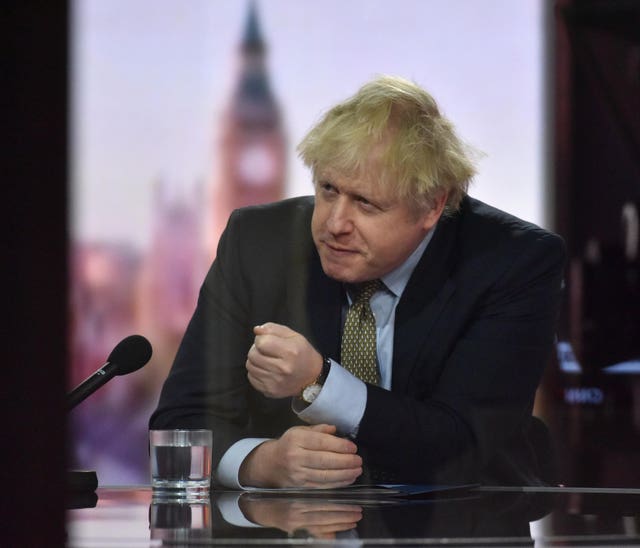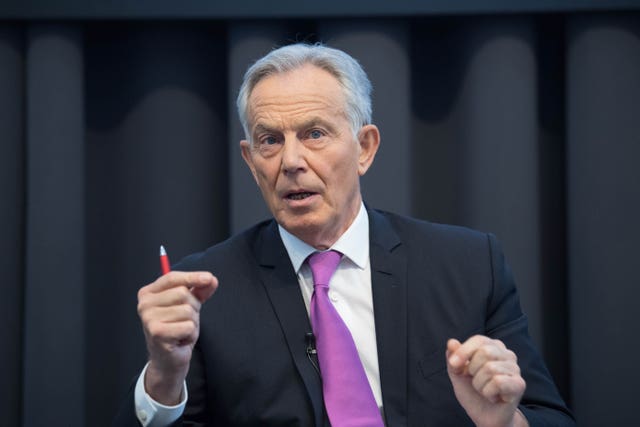
Boris Johnson has insisted he will continue as Prime Minister in the wake of securing the end of the Brexit transition period.
Mr Johnson said Britain had negotiated a good deal with the EU and there were lots of reasons to be positive about an “otherwise grim new year” amid the coronavirus crisis.
READ MORE: Johnson stands ground on indyref2, suggesting "right sort of gap" would put new poll beyond 2050
Pressed on whether he would remain in Downing Street after finally taking the UK out of the EU, the Prime Minister told BBC1’s The Andrew Marr Show: “Yes.”
Mr Johnson continued: “I think you should break out of your characteristic gloom, if I may say so Andrew.
“Things are very tough, we’re going through a very tough period as a country, but I really think people should focus on the amazing fact this country has created a room-temperature vaccine which can be used around the world.
 Boris Johnson on The Andrew Marr Show (Jeff Overs/BBC)
Boris Johnson on The Andrew Marr Show (Jeff Overs/BBC)
“And we now have freedoms that we haven’t had for 50 years and there are lots of reasons to be very positive about this otherwise grim new year.”
The remarks follow some media speculation that Mr Johnson was considering standing down before the next general election which is slated for 2024.
The Prime Minister said that “substantial sums of money” are coming back to the UK due to Brexit.
He said: “We’ve got control over our borders, a points-based immigration system has already been established.
“And then when it comes to areas in parts of the country that feel that they’ve been left behind, one of the things that you can do for instance, to say nothing more (of) the regulatory changes you can make, one of the things you can do is have free ports.”
The comments came as Labour former prime minister Tony Blair said that decisions for Britain have always rested with the British people, as he compared Brexit to “shock therapy”.
He said: “There is nothing that Brexit’s going to do for Britain on its own. It’s going to leave us economically weaker and with less political influence.
“And so the only way I make sense of Brexit is to treat it as shock therapy, that we then realise we’ve got to take certain big decisions as a country, we’ve got to set out a new agenda for the future, but that’s going to be difficult to do.
“The truth of the matter is these so-called freedoms from European regulation that Brexit’s supposed to give us, they don’t really give us anything much at all.
“Because the truth is that decisions for Britain are and always have been resting with the British people and with the British government that they elect.
“But what it does mean, if we just carry on having the same old political debate post-Brexit as we had pre-Brexit, we’re in a lot of trouble as a country.”
 Labour former prime minister Tony Blair (Stefan Rousseau/PA)
Labour former prime minister Tony Blair (Stefan Rousseau/PA)
Meanwhile, Home Secretary Priti Patel has said she is prepared to give policing and security agencies “even tougher powers to keep this country safe” after the UK’s exit from the EU.
Ms Patel talked up the post-Brexit trade and security deal that was hammered out as the clock ticked down to withdrawal from the bloc, insisting the UK would now be in a better position to protect its borders.
However, the EU has made it clear that under the agreement the UK would not enjoy the same level of “facilities” on policing and security issues as before.
An EU briefing note said the UK would no longer have “direct, real-time access” to sensitive databases covering freedom, security and justice.
READ MORE: Opposition needed to challenge the SNP on Scottish independence says Tony Blair
But the deal does allow for “effective co-operation” between the UK and the Europol and Eurojust policing and criminal justice agencies, in line with the rules for third countries under EU law.
Writing in The Sunday Telegraph, Ms Patel said the agreement “gives our police and security services the tools and partnerships to help keep the public safe.
“And having left the EU means we can give these agencies stronger powers to keep this country safe.
“That includes banning foreign criminals who have served more than a year in jail from entering the UK.


Why are you making commenting on The Herald only available to subscribers?
It should have been a safe space for informed debate, somewhere for readers to discuss issues around the biggest stories of the day, but all too often the below the line comments on most websites have become bogged down by off-topic discussions and abuse.
heraldscotland.com is tackling this problem by allowing only subscribers to comment.
We are doing this to improve the experience for our loyal readers and we believe it will reduce the ability of trolls and troublemakers, who occasionally find their way onto our site, to abuse our journalists and readers. We also hope it will help the comments section fulfil its promise as a part of Scotland's conversation with itself.
We are lucky at The Herald. We are read by an informed, educated readership who can add their knowledge and insights to our stories.
That is invaluable.
We are making the subscriber-only change to support our valued readers, who tell us they don't want the site cluttered up with irrelevant comments, untruths and abuse.
In the past, the journalist’s job was to collect and distribute information to the audience. Technology means that readers can shape a discussion. We look forward to hearing from you on heraldscotland.com
Comments & Moderation
Readers’ comments: You are personally liable for the content of any comments you upload to this website, so please act responsibly. We do not pre-moderate or monitor readers’ comments appearing on our websites, but we do post-moderate in response to complaints we receive or otherwise when a potential problem comes to our attention. You can make a complaint by using the ‘report this post’ link . We may then apply our discretion under the user terms to amend or delete comments.
Post moderation is undertaken full-time 9am-6pm on weekdays, and on a part-time basis outwith those hours.
Read the rules hereLast Updated:
Report this comment Cancel